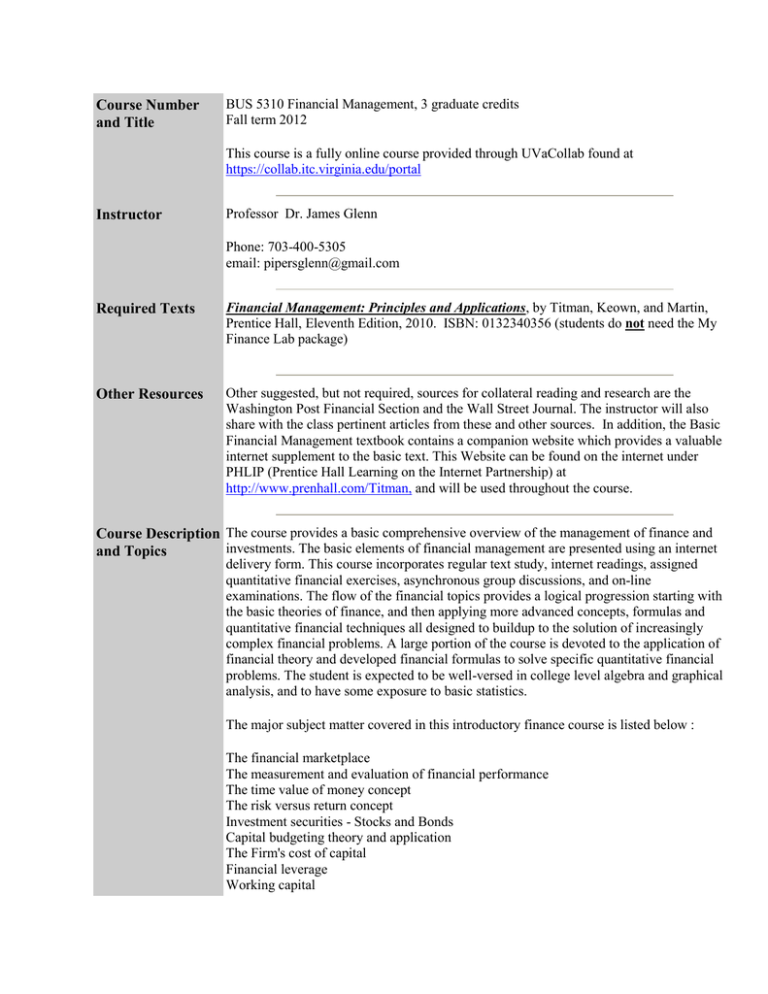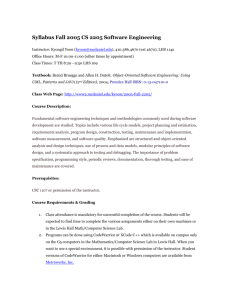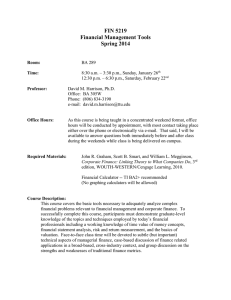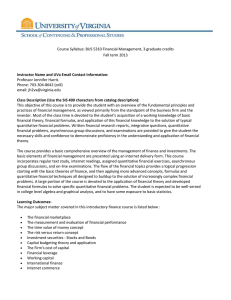Course Number and Title BUS 5310 Financial Management, 3
advertisement

BUS 5310 Financial Management, 3 graduate credits Fall term 2012 Course Number and Title This course is a fully online course provided through UVaCollab found at https://collab.itc.virginia.edu/portal Professor Dr. James Glenn Instructor Phone: 703-400-5305 email: pipersglenn@gmail.com Required Texts Financial Management: Principles and Applications, by Titman, Keown, and Martin, Prentice Hall, Eleventh Edition, 2010. ISBN: 0132340356 (students do not need the My Finance Lab package) Other Resources Other suggested, but not required, sources for collateral reading and research are the Washington Post Financial Section and the Wall Street Journal. The instructor will also share with the class pertinent articles from these and other sources. In addition, the Basic Financial Management textbook contains a companion website which provides a valuable internet supplement to the basic text. This Website can be found on the internet under PHLIP (Prentice Hall Learning on the Internet Partnership) at http://www.prenhall.com/Titman, and will be used throughout the course. Course Description The course provides a basic comprehensive overview of the management of finance and investments. The basic elements of financial management are presented using an internet and Topics delivery form. This course incorporates regular text study, internet readings, assigned quantitative financial exercises, asynchronous group discussions, and on-line examinations. The flow of the financial topics provides a logical progression starting with the basic theories of finance, and then applying more advanced concepts, formulas and quantitative financial techniques all designed to buildup to the solution of increasingly complex financial problems. A large portion of the course is devoted to the application of financial theory and developed financial formulas to solve specific quantitative financial problems. The student is expected to be well-versed in college level algebra and graphical analysis, and to have some exposure to basic statistics. The major subject matter covered in this introductory finance course is listed below : The financial marketplace The measurement and evaluation of financial performance The time value of money concept The risk versus return concept Investment securities - Stocks and Bonds Capital budgeting theory and application The Firm's cost of capital Financial leverage Working capital International finance Internet commerce Course Objectives This objective of this course is to provide the student with an overview of the fundamental principals and practices of financial management, as viewed primarily from the standpoint of the business firm and the investor. Most of the class time is devoted to the student's acquisition of a working knowledge of basic financial theory, financial formulas, and application of this financial knowledge to the solution of typical quantitative financial problems. Written financial research reports, integrative questions, quantitative financial problems, asynchronous group discussions, and examinations are provided to give the student the necessary skills and confidence to demonstrate proficiency in the understanding and application of financial theory. Weekly Course Routine Instruction: The UVaCollab site for this course includes the syllabus, resources, assignments, and evaluations. For each week, the course materials include a “to do list” that will guide you through what needs to be accomplished that week. The course also includes a midterm and a final that will be available through the UVaCollab site as well. The following information outlines the routine conduct and flow of this course. The BUS531 Financial Management course will be conducted in weekly unit segments in accordance with the syllabus schedule. The Class Week is the basic unit of instruction. It is important for overall class interaction and to maximize the learning opportunity that all students stay current with each week's activity. Exactly when you accomplish your tasks within each Unit (course week) is up to you, but you are expected to remain current at the end of each Unit of instruction. The normal Unit of instruction will begin each Monday and will end the following Sunday night. Each Monday I will open a new Unit course of study in our course site on UVaCollab. A typical unit course of study will normally include the following discrete activities: 1. To Do List ----------------- A listing of the required readings and assignments for the week 2. Mini-Lecture(s) ----------- Additional or supplementary instructor presentations 3. Homework Problems ------- Problems to be completed to be ready for the midterm and final; only selected problems will be turned in that week, if any 4. Threaded Discussion ---- A Unit asynchronous interactive conference (included in some, but not all weeks) One asynchronous threaded discussion above the first week’s unit will be available each week to facilitate class communication between the students, and between the students and the instructor. This open conference discussion is intended to allow students to work together, ask and answer questions, exchange information on each week's course of material, and, of course, to directly ask the instructor any questions that the student may have. If you wish to specifically address a question to me in this forum, please make sure to include my name in the question. As an illustrative example--"Prof Harris - how do you spell finance?" Throughout the course, in selected weeks, there will be a graded discussion. To earn full points in these discussions, post your reply and respond to the posting of another student, further, you must post on two different days of the week. For example, you could reply to the main question on Tuesday and then reply to another student’s post on Friday. This sequence of posts would meet both requirements (number of posts and number of days). In appropriate course weeks, the routine instruction unit cycle will be modified to allow, respectfully, for concentration on the on-line Midterm Examination and inclusion of a final course review in preparation for the Final Examination. Communication: Announcements, discussion boards, and email will be used to facilitate communication during this course. Throughout the course, announcements will be posted to remind students of deadlines, to let students know when assignments have been graded, or to update students on other issues related to the course. Discussion boards will be used through the course in selected weeks to discuss specific financial topics. One discussion board will be dedicated to student questions and will be open throughout the course. Finally, email will be used to let specific students know about any concerns. Students are invited and encouraged to email the instructor to address any concerns that would not be appropriate addressed in the course discussion boards. Assignments: Assignments will be listed each week in UVaCollab. The “to do list” provided each week will help you plan your work. The weeks for the midterm and final are provided in the schedule at the end of this syllabus. Resources: In most weeks, the instructor will provide additional resources for that week’s materials. This often includes websites and may also include links to helpful videos. Course Evaluations: Course evaluations will be distributed online. Prior to the end of the semester, students will receive the course evaluation through email.









